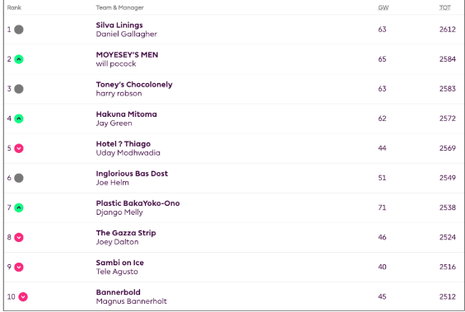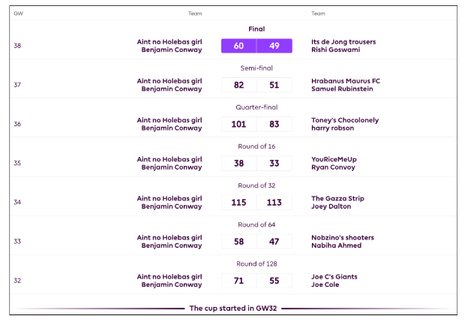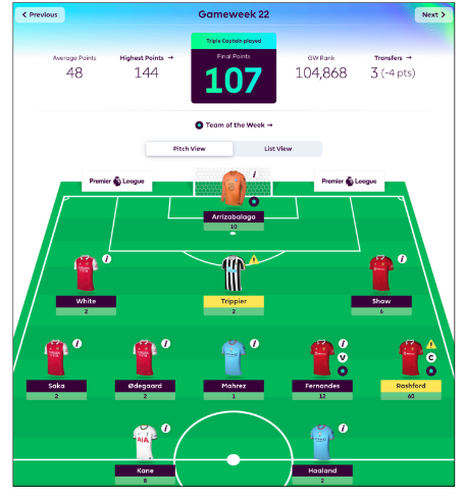Decision theory specialist emerges victorious in inaugural Varsity Fantasy Premier League
Ben Conway explores the outcome of his FPL hypothesis and hears from the season’s top performers

Just over a year ago, I claimed that Economics students are best suited to doing well in fantasy football. In my eyes, viewing Fantasy Premier League (FPL) as a game of statistical analysis is the winning approach. This means considering variables and being able to objectively and critically assess real-life data in limited time, something which a Cambridge Economics degree arguably teaches its students to do better than any other degree. To test this hypothesis, two months later I started the inaugural Varsity FPL league. It was met well by Varsity’s readership, with more than 100 players by the time I closed off entry.
These two articles saw me invited onto a BBC Sounds podcast to profess my apparent FPL wisdom. Emphasis should be put on “apparent” because, in hindsight, the advice that I offered was better ignored. My main tip was to pack the backline with premium picks, given the impressive 2021/22 seasons from defenders like Alexander-Arnold, Cancelo, and James. The first two of these were both in the top five point-scorers last season, and James could well have been if he wasn’t so injury-prone. Instead, Alexander-Arnold underperformed in a leaky Liverpool defence, Cancelo left for Bayern Munich in January, and James spent much of the season sidelined again, leaving me feeling quite sorry for myself. Trippier, who started the season as a budget option, ended the season as the highest scoring defender.
In my defence (pun intended), I cited Rashford as a “nifty pick” in the second article, and had the foresight to drop three premium defenders with a Gameweek 7 wildcard. But my slow start meant that I crawled to a 14th-place finish in the Varsity league. Nevertheless, I managed to win the knockout cup competition with a strong finish to the season.
That’s enough about me though; let’s hear from the some of the top performers, who I asked to reflect on the factors behind their success.

Silva Linings, managed by Daniel Gallagher, finished in overall rank 8194 out of the over 11 million FPLers this year, putting him in the top 0.08% of players. Daniel is currently studying for an MPhil in Philosophy. He tells me that his degree might well have contributed to his success: “I do specialise in decision theory within philosophy, and I’m also a chess National Master. So I’m used to thinking about expected value of different decisions, and also love strategy games, which helps for FPL”. He even cited Magnus Carlsen, the ex-chess world champion who came tenth in FPL in 2019/20, as his inspiration for playing FPL. Daniel might not be an Economics student, but the link between the skills gained in his study and their use in FPL was nevertheless vindicating for me.
The links continued. Will Pocock, who finished second in the Varsity league, cited “skills of disinterested analysis” as central to his impressive season. This concept concerns objectivity, and trying to distance yourself from your own interests within judgements. Originated by Matthew Arnold, a 19th Century literary and cultural theorist, Will studied it as a part of his English degree. West Ham fan Will was very good at this; apart from choosing Bowen for his Free Hit, he didn’t pick a West Ham player throughout the whole season. This was a good idea, as not one of them exceeded four points per game this season, and it demonstrates why FPLers really should trust head over heart.
Fifth place Uday Modhwadia told me that studying Geography “taught me the importance of seeking information from diverse sources”, meaning that he stayed “well-informed by gathering insights from various outlets”. Uday’s favourites were Andy at Let’s Talk FPL and The FPL Wire podcast. Third place Harry Robson told me that studying for a PhD in Psychology helped because “a lot of psychology is about weighing up different approaches and theories when tackling an issue”. Despite his impressive rank, he still considered his season a “failed” one, because he lost to second-placed Will – his housemate – by a single point.

What’s the conclusion to my investigation? My idea that Economics students are best at FPL has been emphatically rejected. At least I’ve highlighted the types of skills gained from university education that can allow students to excel at FPL, and also that formal study can have a hand in extracurricular success.
Interestingly, the winner, Daniel, had an exceptional season in both senses of the word. Not only was it outstanding, but it was his first season in eight years of playing the game in which he finished in the top million players. So maybe, just maybe, there’s more luck involved in fantasy football than I was willing to admit a year ago, and the most sensible conclusion is that I should lay off the FPL statistics and focus on my exams.
 News / Colleges charge different rents for the same Castle Street accommodation2 March 2026
News / Colleges charge different rents for the same Castle Street accommodation2 March 2026 News / News in Brief: waterworks, wine woes, and workplace wins 1 March 2026
News / News in Brief: waterworks, wine woes, and workplace wins 1 March 2026 News / Climate activists protest for ‘ethical careers policy’1 March 2026
News / Climate activists protest for ‘ethical careers policy’1 March 2026 News / Angela Merkel among Cambridge honorary degree nominees27 February 2026
News / Angela Merkel among Cambridge honorary degree nominees27 February 2026 News / Private school teacher who lied about Cambridge degree barred from teaching27 February 2026
News / Private school teacher who lied about Cambridge degree barred from teaching27 February 2026








